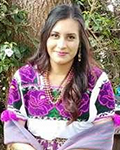2017
Sandra Jasmin Gutierrez
- Doctoral Candidate
- University of California, Davis

Abstract
In 1979, a P’urhépecha community in Michoacán, Mexico mobilized to defend their lands from a group of cattle ranchers who had been invading them for decades. The weapons they used were their collective history, communal practices, and strategic organization mechanisms, which they shaped within their traditional social structures and cultural values. Considering this moment as the inception of contemporary P’urhépecha political movements oriented toward the recognition of indigenous collective rights and self-determination, the project examines indigenous organization and autonomy practices in Michoacán’s P’urhépecha region from 1979 to 2015. Through a historical analysis that engages archival and ethnographic research to track these movements, the project demonstrates that the P’urhépecha have deployed successfully history, community, and ethnicity as weapons of resistance and as core elements of their claims to autonomy. It shows that Indigenous historical experiences are highly valuable, for they unveil innovative and successful mechanisms of political mobility.

